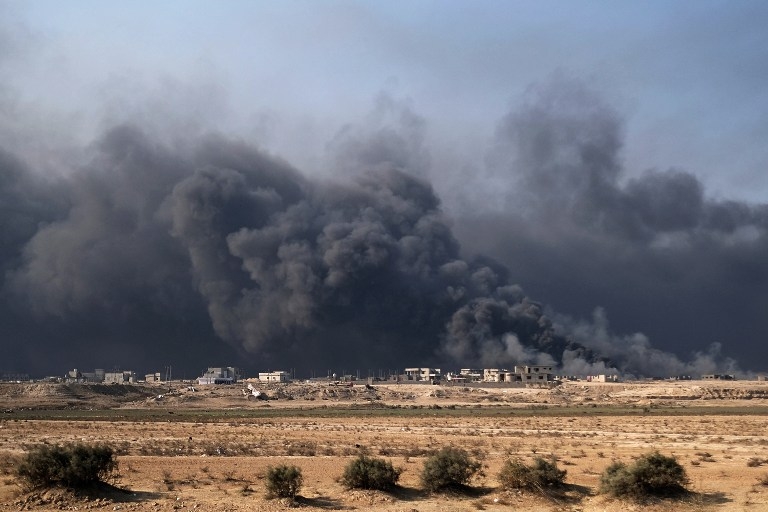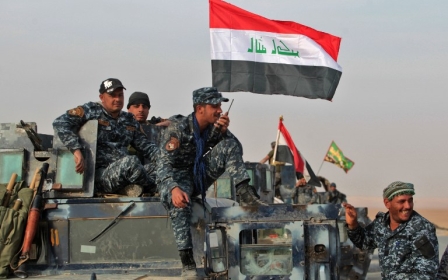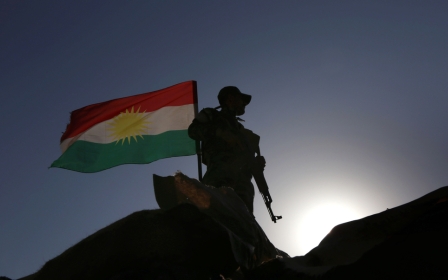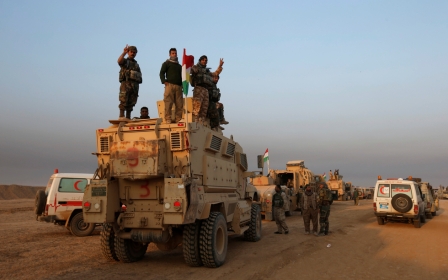Islamic State accused of using chemical weapons in northern Iraq

Human Rights Watch has warned that the Islamic State (IS) group is using chemical weapons as it retreats in the face of an operation by Iraqi forces to retake the city of Mosul.
According to the organisation, IS launched at least three chemical attacks on the town of Qayyarah, 60km south of Mosul, in September and October after the town was captured by Iraqi forces in August.
The attacks, which caused burns to at least seven people, are consistent with the effects of chemical warfare agents known as "vesicants."
HRW said that the use of such weaponry constitutes "war crimes."
“ISIS attacks using toxic chemicals show a brutal disregard for human life and the laws of war,” said Lama Fakih, deputy Middle East director, using the alternative acronym for the group.
“As ISIS fighters flee, they have been repeatedly attacking and endangering the civilians they left behind, increasing concerns for residents of Mosul and other contested areas.”
IS had previously been accused of using chemical weapons in September, during an attack of the Qayyarah West airbase, but coalition spokespersons later said that they had found no evidence of a chemical agent being used.
However, the evidence gathered by HRW suggests otherwise - on September 21 a projectile that landed in a family's garden, oozing liquid, led to burns and blisters to four people. Another projectile on October 6, which struck near the front of a cafe, led to similar burning for two people.
“ISIS has sought to paint itself as protector of Sunni Arabs in Iraq, yet it is willing to use chemical weapons on them in their own homes,” Fakih said.
The group have also been accused of using chemical weapons in Syria.
Elite Iraqi troops battled IS in the streets of Mosul on Friday, as the UN reported the group had executed dozens of people inside the city for alleged "treason".
With IS also on the defensive in neighbouring Syria, US-backed forces pressed an advance on the bastion of Raqqa after a sandstorm eased.
The high winds in the desert which separates the Syrian Kurdish-Arab militia alliance from the IS stronghold in the Euphrates Valley had slowed their advance on Thursday as visibility levels plummeted.
Iraqi forces too had regrouped after meeting stronger than expected resistance from IS fighters on the eastern bank of the Tigris River which runs through Mosul after thrusting into the built-up area last week.
Commanders of Iraq's elite Counter-Terrorism Service (CTS) said that troops were advancing on two eastern neighbourhoods of the city.
In a house near the frontline, Staff Lieutenant Colonel Muntadhar Salem clutched a radio in one hand and a tablet in the other with a map showing several rows of buildings recaptured by CTS.
As the troops waited for orders to push forward, incoming mortar rounds shook the pink curtains on the windows of the house.
Inside Mosul itself, IS fighters reportedly shot dead more than 60 people this week and hung some of their bodies from poles after claiming they had collaborated with Iraqi troops, the UN human rights office said on Friday.
"On Tuesday, ISIL (IS) reportedly shot and killed 40 civilians in Mosul city after accusing them of 'treason and collaboration'" with the ISF, rights office spokeswoman Ravina Shamdasani said in a statement released in Geneva.
And on Wednesday, IS slaughtered another 20 people at the Ghabat Military Base in northern Mosul after accusing them of "leaking information," the UN statement said.
The battle to retake Mosul is now in its fourth week, and while troops have entered the built-up area, there are weeks, if not months, of fighting still to go.
"Our forces have begun the attack on Arbajiyah. The clashes are ongoing," Salem said, referring to an area in the east of the city.
New MEE newsletter: Jerusalem Dispatch
Sign up to get the latest insights and analysis on Israel-Palestine, alongside Turkey Unpacked and other MEE newsletters
Middle East Eye delivers independent and unrivalled coverage and analysis of the Middle East, North Africa and beyond. To learn more about republishing this content and the associated fees, please fill out this form. More about MEE can be found here.




